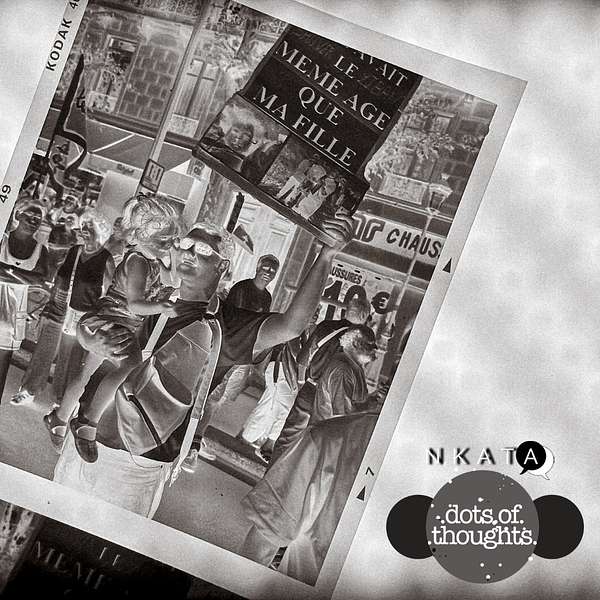
NKATA: Dots of Thoughts
NKATA: Dots of Thoughts
EP14: Being Palestinian, a Life of Permanent Temporality – with Bahaa Abudaya
In 2006, I remember photographing, in Paris, the protest against killings that then took place in Isreal and Palestine. In the photo, a father is clutching his little daughter on one hand, while with the other hand, waves a placard that reads “Le meme age que ma fille” (same age as my daughter). I remember feeling deeply struck by this double emphasis aimed at reiterating what should be so obvious: the trail and ensuing threads of human violence – like mitochondria – run and connect to us all.
In this podcast conversation, I caught up with a longtime friend and fellow artist Bahaa Abudaya to discuss the most recent eruption of violence which took place in May 2021.
Bahaa left Gaza when he was two years old. Since then, he has roamed the earth. Yet he claims: no matter where I go, I always consider myself a Palestinian even though I do not know, from lived experience, what Palestine is as a place. He goes on to explain that this deeply inward, yet unforced identification with Palestine is constitutive of his disposition as one who is in a state of permanent temporality.
“I am never clear where I should be. I have developed a kind of personality through this kind of exile”.
Here, we are presented with the paradox often a fixture of border-bodies: on one hand, a solace accompanies the feeling of never being beholden to a place. On the other hand, there is something about transience that denies one a sense of continuity. Rightfully so, Bahaa concludes that his life is floating somewhere in between these unresolvable polarities.
His Palestine is one he anchors to a memory of displacement. He recalls an anecdotal event that took place when he was ten years old. His grandmother took him to the site where her home once stood before the occupation. The most indelible moment of the visit was witnessing his grandmother shed tears profusely. As a child, he could not understand why absence meant so much for her. Her tears became symbolic of an incomprehensible, ungraspable loss that he would carry with him as a placeholder for what it means to be Palestinian. “Every Palestinian makes his or her own Palestine for themselves”, he said in the podcast. They make their Palestine out of ruins and loss. That is why the picture of young Palestinian kids throwing pebbles at Israeli armoured tanks should be read beyond its photogenic attributes.
The Israeli army, c
Hi, amazing listeners! Emeka Okereke here. I am the founder and host of this show. If you’ve enjoyed the stories, insights, and creativity we bring to this podcast series, I invite you to join my Patreon community at patreon.com/EmekaOkereke. 🎉
By becoming a patron, you’ll gain exclusive access to my artistic world, including:
• Behind-the-scenes content from my photography projects.
• Sneak peeks of upcoming films, vlogs, and video podcasts.
• Exclusive DJ playlists curated just for you.
• Bonus podcast episodes and a chance to contribute to future topics.
Whether you’re a fan of the podcast, my visual storytelling, or simply love art and creativity, there’s a tier for you. Your support helps me continue creating high-quality content, and it truly means the world to me.
Thank you for listening. Follow Nkata Podcast Station on Instagram @nkatapodcast and Twitter.
See the website for extensive materials: nkatapodcast.com
